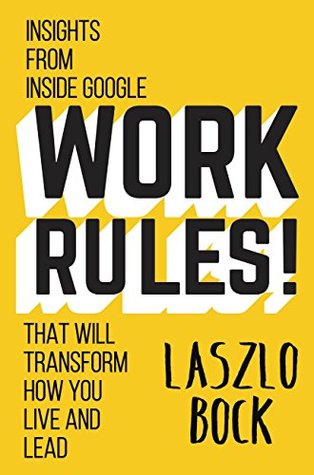More on this book
Community
Kindle Notes & Highlights
by
Laszlo Bock
Read between
September 5 - October 10, 2017
“When employees trust the leadership, they become brand ambassadors and in turn cause progressive change in their families, society, and environment. The return on investment to business is automatic, with greater productivity, business growth, and inspired customers.”
Henry Ford is best known for his sweeping adoption of the assembly line. It’s less well known that his philosophy of recognizing and rewarding work was remarkably progressive for the time: The kind of workman who gives the business the best that is in him is the best kind of workman a business can have. And he cannot be expected to do this indefinitely without proper recognition.… [I]f a man feels that his day’s work is not only supplying his basic need, but is also giving him a margin of comfort, and enabling him to give his boys and girls their opportunity and his wife some pleasure in life,
...more
All successful organizations resemble one another as well. They possess a shared sense not just of what they produce, but of who they are and want to be. In their vision (and perhaps hubris), they’ve thought through not just their origin, but also their destiny.
The most talented people on the planet want an aspiration that is also inspiring. The challenge for leaders is to craft such a goal.
Having workers meet the people they are helping is the greatest motivator, even if they only meet for a few minutes. It imbues one’s work with a significance that transcends careerism or money.
The simple act of making performance transparent was sufficient to transform patient outcomes.
Either you believe people are good and you welcome their input, or you don’t.
My experience is that people who score high on conscientiousness “work to completion”—meaning they don’t stop until a job is done rather than quitting at good enough—and are more likely to feel responsibility for their teams and the environment around them. In other words, they are more likely to act like owners rather than employees.
Now, budgets may seem different. The whole point of a budget is that you’re supposed to stay within it. But at Google you should always, always make room for a truly exceptional person, even if it puts you over budget. And yet many of us have such a built-in respect for following norms that it feels revolutionary to suggest that.
Relying on data—indeed, expecting every conversation to be rooted in data—upends the traditional role of managers. It transforms them from being providers of intuition to facilitators in a search for truth, with the most useful facts being brought to bear on each decision. In a sense, every meeting becomes a Hegelian dialectic, with presenters providing a thesis and the folks in the room providing an antithesis, spurning opinion, questioning facts, and testing which decision is correct. The result is synthesis, a closer approximation of truth than if we had relied on mere pronouncements. One
...more
What managers miss is that every time they give up a little control, it creates a wonderful opportunity for their team to step up, while giving the manager herself more time for new challenges.
“Traditional performance management systems make a big mistake. They combine two things that should be completely separate: performance evaluation and people development. Evaluation is necessary to distribute finite resources, like salary increases or bonus dollars. Development is just as necessary so people grow and improve.”
“What are your goals for this meeting?” “How do you think each client will respond?” “How do you plan to introduce a difficult topic?” We’d conduct the meeting, and on the drive back to our office he would again ask questions that forced me to learn: “How did your approach work out?” “What did you learn?” “What do you want to try differently next time?” I would also ask Frank questions about the interpersonal dynamic in the room and why he pushed on one issue but not another. I shared responsibility with him for ensuring I was improving.
As the data show, exceptional contributors perform at a level so far above that of most, that they are able to pull the average up well past the median.
Kathryn Dekas, a PhD member of our PiLab, described the harm that this situation created: “Fairness perceptions are very powerful. They affect how people think about almost everything at work, but especially how valued they think they are, how satisfied they are with their jobs, how much they trust their supervisors, and their commitment to the organization.”
Despite telling us they would prefer cash over experiences, the experimental group was happier. Much happier. They thought their awards were 28 percent more fun, 28 percent more memorable, and 15 percent more thoughtful.
And they stayed happier for a longer period of time than Googlers who received money. When resurveyed five months later, the cash recipients’ levels of happiness with their awards had dropped by about 25 percent. The experimental group was even happier about the award than when they received it. The joy of money is fleeting, but memories last forever.
We use our people programs to achieve three goals: efficiency, community, and innovation.
Research on how people join teams and companies shows that some employees don’t sit idly by, waiting for someone to “onboard them.” Rather, they onboard themselves by reaching out to coworkers, seeking out resources, asking questions, and setting up lunches to build their networks. People who demonstrate this scrappy, proactive behavior become fully effective faster and perform better on tests of acculturation.


